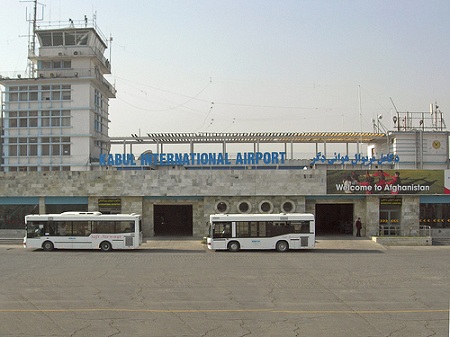By Jason Ukman
Kabul’s international airport has long been seen as a virtual black hole for foreign currency, the perfect venue through which travelers can smuggle out hundreds of millions of dollars in U.S. aid that was intended for development projects.
More than a year after The Washington Post first disclosed American concerns about the airport, a report released Wednesday by the U.S. special inspector general for Afghanistan reconstruction concludes that attempts to choke off the exodus of cash have been plagued by a hard-to-fathom set of obstacles.

This photo was taken on October 19, 2008 in Bībī Mahrū, Kabul, Kabul, Afghanistan. (Photo: Carl Montgomery/Flickr)
The installation of currency-counting machines to better trace illicit funds at the airport — one of the centerpieces of a plan by the Department of Homeland Security — was delayed by seven months because U.S. and Afghan officials could not agree on where to put them.
Once the machines were installed, in April, Afghan customs officials began using them to count the cash but not to record serial numbers or to report financial data, necessary steps to determine whether the money being carried out of the country had been siphoned from aid flowing in.
It took eight months for U.S. and Afghan officials to agree on where to place signs at the airport informing passengers of the requirement to declare cash totalling more than $22,000. Americans officials were unable to get approval to place the signs at the entrance to the airport, so they are now located beyond the point where passengers pass through customs.
“As a result,” the report noted, “passengers are not informed of the requirement to declare the currency until it is too late.”
Meantime, VIPs are still allowed to leave the airport without having their cash scanned through the currency counters — one of the main points of concern for U.S. officials, who believe some businessmen are carrying bagfuls of illicit cash to the Persian Gulf and elsewhere.
Since 2002, Congress has appropriated more than $70 billion to implement security and development assistance projects in Afghanistan. There are growing concerns that much of that money is lost through waste, fraud and other abuses.
The airport represents only one of many potential loopholes when it comes to safeguarding U.S. cash, according to the new audit from the special inspector general for Afghanistan reconstruction, known as SIGAR.
The report found that U.S. agencies also are not fully coordinating their efforts to track American cash as it enters Afghanistan. The Afghan government has been reluctant to prosecute some financial crimes. And contractors are allowed to use unlicensed “hawala” money-transfer systems to pay subcontractors.
U.S. agencies have “limited visibility over U.S. cash that enters the Afghan economy — leaving it vulnerable to fraud and diversion to the insurgency,” SIGAR said in a statement.
The report also noted that Afghan President Hamid Karzai has banned U.S. advisers from working at Afghanistan’s central bank. In a statement attached to the report, the U.S. Embassy in Kabul wrote: “Treasury currently has no plans to re-engage at the Central Bank as the working conditions there for advisors have become hostile.”
No further explanation was provided.



